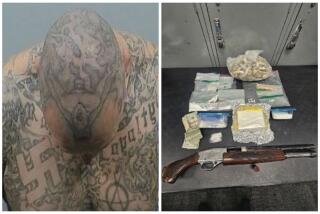Drugs, sex and collusion behind bars in Maryland, indictment says
- Share via
More than a dozen female prison guards in Maryland helped a group of inmates in a dangerous national gang run a drug-trafficking and money-laundering ring from inside the walls, prosecutors contend.
A federal indictment unsealed Tuesday said 13 female guards at the Baltimore City Detention Center smuggled drugs, cellphones and prescription pills to inmates in the Black Guerrilla Family gang by hiding the contraband in their hair, shoes and underwear.
“The inmates literally took over the asylum,” said Stephen E. Vogt, special agent in charge of the Baltimore FBI office, at a news conference Tuesday. “The detention centers became safe havens” for the gang.
The indictment names 25 people, including the 13 guards, who face drug and racketeering charges. Twenty also face money-laundering charges.
All of the officers have been suspended without pay, and the department will recommend they be fired, the Washington Post reported.
Tavon White, also known as “Bulldog,” took control of the Black Guerrilla Family not long after he arrived in 2009, prosecutors said. White had been convicted of attempted murder.
In prison, White used contraband cellphones to maintain his hold on gang activity on the streets from behind bars, the indictment said, and recruited corrections officers and other inmates to help with smuggling and money laundering.
“This is my jail — you understand that?” White said in a phone call authorities recorded, according to the indictment. “I make every final call in this jail.... Everything come to me. Everything.”
The Black Guerrilla Family is a street and prison gang founded in the 1960s at California’s San Quentin State Prison. By the 1990s, the gang was operating in Maryland’s prison system, the Justice Department said, and became intertwined with drug trafficking, robbery and murder in Baltimore.
White had sex with several guards, which “cemented the business ties and the association of the corrections officers with the enterprise,” authorities said. Four guards got pregnant, one of them twice. Two guards tattooed his first name on their bodies, one on her neck, one on her wrist. From behind bars, White bought an Acura, a white Mercedes and a black Mercedes and let the guards drive them, according to the indictment.
Inmates used smuggled cellphones to place orders for drugs and other contraband, the indictment said. Gang members who weren’t incarcerated would give the contraband to the officers, who then smuggled the drugs into the Baltimore City Detention Center and other facilities.
“Administrative hurdles” made punishing guards for smuggling or sexual activity very difficult, the indictment said. Often, guards simply were transferred to another prison.
Because guards rotated through a variety of jobs, the indictment said, the officers helping gang members could smuggle in goods when it was their turn to guard the doors.
Contraband goods like drugs and cellphones did not often set off metal detectors, authorities said. And if they did, guards had three tries to go back to their cars or empty their pockets before they were patted down by a supervisor.
White had informal agreements with guards, telling them he would keep order at the jail if they would turn a blind eye to some of his activities, the indictment said. White has been accused of punishing inmates who would not do what he said.
Members of the Black Guerrilla Family paid dues to a “minister of finance,” who transferred the money to reloadable prepaid Green Dot credit cards, the indictment said. Inmates paid for contraband by texting other gang members their 14-digit credit card number.
If inmates who weren’t members of the gang smuggled something in, White and other gang leaders taxed them, the indictment said. A percentage of the tax went to gang leaders who weren’t in prison.
ALSO:
David Petraeus to teach at CUNY school in New York
5 killed in Illinois shootout; suspect dies after police chase
House votes to honor victims of 1963 Birmingham church bombing
More to Read
Sign up for Essential California
The most important California stories and recommendations in your inbox every morning.
You may occasionally receive promotional content from the Los Angeles Times.











